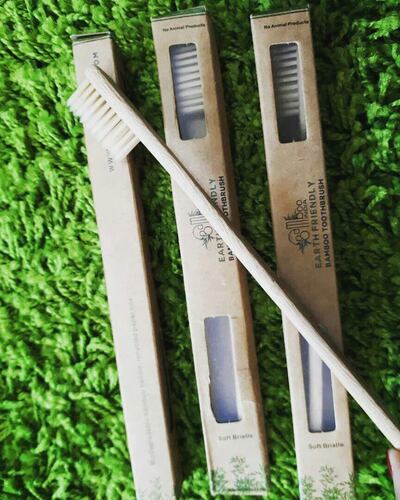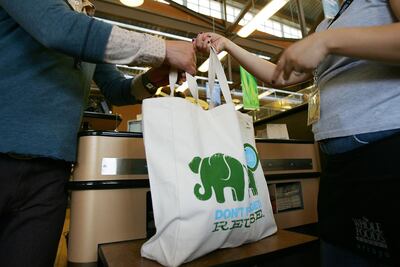The statistics are terrifying and sobering in equal measure. According to trade association group Plastics Europe, 300 million tonnes of plastic was produced in 2016; it's estimated that more than eight million tonnes of the substance enters our oceans each year; and experts believe that by 2050, there will be more plastic in the sea than fish.
There’s no denying that we are in the midst of a global waste crisis. Yet faced with a problem of such enormity, it’s easy for the individual at home to feel overwhelmed and consider the issue as insurmountable. In an attempt to break it down, last year, Shraddha Shrigondekar, and her husband, Paresh, founded Cling Nature, a UAE-based portal selling ecologically sound, sustainable products. She sums things up succinctly: “‘What difference does one plastic toothbrush make?’ asked seven billion people.”
The husband and wife team decided to take action when the catastrophic impact of plastic on the environment was brought to their attention, which was also the time when they realised just how reliant they had become on single-use items, such as disposable bags, straws, cutlery and tableware.
“It wasn’t an easy journey. We started with small changes in our home, and then the idea of spreading awareness and providing plastic-free alternatives began to emerge,” Shrigondekar says. “Now we sell eco-friendly products that allow people to make simple, sustainable changes to their everyday life; things such as natural bamboo toothbrushes, straws, cutlery and crockery.”
_______________
Read more:
WATCH: Public Services cleaner caught dumping rubbish on RAK beach
Dubai restaurants 'stop sucking' in bid to reduce plastic waste
UAE scientists concerned about 'catastrophic' plastic use across the globe
_______________
As Shrigondekar rightly puts it, this isn’t about being sanctimonious or making grandiose, unrealistic claims: while it would be wonderful to lead a plastic-free existence, for many of us this is simply not currently possible. What we can do, though, is stop, take stock and really hone in on reducing our plastic consumption, as well as recycling, reusing and generally being more proactive about how we dispose of our waste. Here are a few ideas.
1. Forgo disposable items
This one is a no-brainer, not least because a recent analysis of common bottled water brands revealed that, casing aside, more than 90 per cent contain tiny pieces of plastic within. Millions of plastic bottles and cups are thrown away daily and, scientists estimate that each takes 1,000 years to break down.
Buy yourself a stainless steel water bottle and coffee thermos. It won’t take long to get into the habit of not leaving the house without them (we found that denying ourselves our morning latte on the days we forgot, helped).
Rather than reverting to plastic Tupperware, get creative with your non-plastic food-storage solutions: sealable glass tubs, jars and boxes all do the same job, as do handy wooden and stainless steel Bento boxes and stacked tiffin jars.
2. Switch to a biodegradable bamboo toothbrush
General guidance from dentists suggests that we should change our toothbrush every three or four months. Over a lifetime, that’s a whole lot of tooth-brushing receptacles. What you might not be aware of is that if you use a plastic brush, it will never biodegrade. That’s right, every single plastic toothbrush that has ever been made remains in landfills to this day. Switch to an eco-friendly bamboo alternative, though, and you can feel good about polishing those pearly whites.
3. Shop smart
Stash reusable shopping bags in your car, handbag, buggy, or fold them concertina-style in the pocket of your trousers – whatever works, just don’t pick up plastic ones at the checkout.
When food shopping, buy the least packaged version of every item or ingredient you can. Once you start noticing excess packaging, you’ll be shocked by its ubiquity and the sheer amount of waste: peaches nested in a styrofoam tray covered in plastic wrap; a single avocado shrouded in cling film despite its natural casing. The list, unfortunately, goes on.
Instead, select loose fruit and vegetables, and have them weighed and stickered individually. Note that sticky labels are an issue in themselves, and a number of international supermarkets are currently trialing laser marking and natural branding, but at this point they are preferable to plastic bags.
Steps such as choosing an edible ice-cream cone over a tub, switching from tea bags to loose-leaf tea (the majority of tea bags have plastic added to them to help seal the bag itself), and wrapping sandwiches in parchment paper or reusable sandwich bags rather than slipping them into a ziplock baggie may seem so small as to be inconsequential, but are actually far from it.
4. Say no to disposable cutlery and plastic straws
Purchasing a couple of sets of natural, biodegradable cutlery, and taking them out and about with you will hopefully mean that you rarely have to use a plastic knife, fork or spoon again. If circumstances dictate you must, you can always take home the used disposable cutlery and recycle them. When ordering takeout, seek out places that either don’t use plastic cutlery, give you the choice to opt out or, if needs be, pay a little bit extra (we’re talking fils not dirhams) and get yourself a biodegradable set.
Encouragingly, the Stop Sucking anti-plastic-straw campaign spearheaded by Freedom Pizza seems to be gaining traction in the UAE, and its #dontsuck initiative has become an industry talking point. Restaurants who have recently pledged to cease using plastic straws include Folly by Nick & Scott, Publique, Reform, Noodle House, Al Nafoorah, Pai Thai, Perry & Blackwelder’s and Trattoria Toscana among others. So, by all means, refuse the plastic straw and don’t be shy about doing so. If you miss sipping your drink through a straw, add a stainless steel one to your cutlery stash.
The ultimate goal? Packaging leftovers after eating in a restaurant in your own recyclable containers.
5. Buy big
Consider purchasing store-cupboard essentials in bulk and decanting them into sealable glass containers or jars at home. Not only does buying items such as coffee, pasta, rice, nuts, seeds, spices, dried pulses, cereal and suchlike en masse cost less, but also it saves substantially on packaging. The same goes for non-edible kitchen products: opt for large refills of washing-up liquid, dishwasher powder, detergent and the like, choose bars of hand soap instead of the liquid variety, and consider using biodegradable, reusable and antibacterial Bee’s Wrap from the eponymous sustainable food storage company, instead of cling film.




